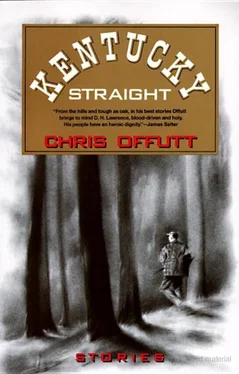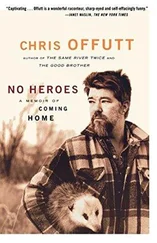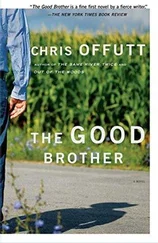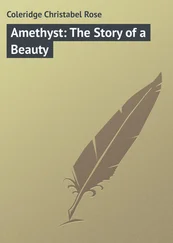“No, not that. After that. She begged me after.”
“What?”
“To kill her.”
He inhaled, watching the smoke stream into the air like water. The cigarette fell. He lowered his face to his hands and cried for a long time.
Beth tethered the mule on the creek bank, walked down to the pickup, and tumbled Casey to the ground. She used a crowbar to pry the seat loose from the truck. She tied him to the seat and hooked the logging chain to a rusty spring. At the top of the hill, she broke a willow switch and whipped the mule. Muscles rippled beneath its hide. Each nostril puffed mist and saliva foamed from its mouth.
“Pull,” Beth yelled again and again.
The mule lurched slowly forward. When the seat reached the top of the ridge, Beth wedged a shoulder under Casey’s crotch, and lifted him across the animal’s back. She tied his wrist to an ankle, knotting the rope tight against the mule’s belly. Her clothes were damp with sweat. Casey and the animal formed a black seamless shape in the darkness of the woods. Beth led the mule down the hollow and up the creek. At the wide place where she’d first met Casey, she tossed Lil’s hair into the water, and watched it swirl away.
She unloaded him onto the porch and threw a quilt over him. Casey curled on his side, tucking hands between his knees, his breath coming in ragged snorts. Beth undressed and cleaned the bruised wound on her hip. Her face was scratched and her feet ached. She lay in bed, wishing the long night all those years ago had been this easy. It had broken a part of Casey and graveled him up pretty bad. She didn’t think about it often but when she did, she knew that what they’d done was right. Their four girls were proof enough, grown now, and gone.
Hours later she woke from Casey’s weight on the mattress. Outside, a rooster bellowed to his hens. Casey’s face poked pale and slack from the quilt.
“I lost the truck, Beth.”
“You’ll find it.”
“But I came home,” he said. “I always come home.”
“Lay down now.”
She scooted across the tick. Casey fumbled straps and slid his overalls to the floor. Beth spread the quilt over them as he snuggled against her.
“Ain’t never stayed a night away but the one, Beth.”
“I know.”
“Wished I hadn’t then.”
“I never think about it anymore.”
“You didn’t kill Lil, did you?”
“No.”
“Sometimes I don’t think I been much good to you.”
“You’re here,” Beth said.
“I feel kindly rough.”
“Still drunk’s all. There’s one good way to cure that and I don’t mean coffee.”
She opened her legs and towed Casey until his head lay between her breasts. She groaned as he mashed her hip.
“What’s wrong, Beth?”
“Hip.”
“Bad hurt?”
“No. Banged it on the corncrib or something.”
“You always did hurt too easy.”
She smiled at his ear, brushing her fingers along his lower back. He smelled of dirt and moonshine. She lifted her knees to guide him with her thighs.

Every afternoon Everett and his father drove to Clay Creek Grade School for barrels of leftover lunch to feed their hogs. Everett kept the heater on year-round to blow the smell out the windows. The WPA had built the grade school fifty years ago, but next summer the state was closing it.
Everett glanced at his father, who stared straight ahead, a warm beer between his legs.
“What’ll we do when school shuts down?” Everett said.
“Get by, I reckon.”
Everett left the blacktop for Bobcat Hollow, driving with his head tipped to aim his good eye at the road. He slowed for an oak bridge, gray from sun and flood. Steep hills laced with rock and timber rose on both sides of the narrow hollow. At its end, their house jutted from the hillside, its front supported by columns of stacked brick. Barbed wire fenced the yard to pen the hogs. Everett backed the truck to the wooden trough, watching hogs charge across the lot, their undersides stained brown by mud.
“Ain’t nothing cheaper than hogs to raise,” his father said. He threw his empty beer can in the creek and walked to the house.
Everett emptied a barrel of slop over the fence. The steady stream was almost pretty, fast-flowing threads of milk specked with broccoli and corn. The boar stood at the middle of the trough while the rest fought for position, snapping their jaws and thudding heavy flanks. The smallest hog waited in the rear.
A dark strip of sky lay above the ridge and Everett wondered what he could see if hills weren’t everywhere he looked. His three older brothers lived out there but never came home, wrote, or called. His father liked to say they’d all left as soon as they were weaned except the runt and the bitch — Everett and his sister. Sue hadn’t really moved out, she just stopped sleeping at home.
He walked the board path to the house, where the scent of frying pork churned his stomach. For years pork had been his favorite meal. Now ham tasted the way slop smelled. He had explained this to his sister once and a grin had creased her freckles.
“Ain’t nothing wrong with that,” Sue said. “It’s like the time I ate violets on account of them smelling so good. Just to look at them makes me want to vomit now.”
Everett nodded, awed by her wisdom in simple matters. She’d always said he was lucky to have a walleye; it allowed him to see more than other people, and she wished she’d gotten it instead of him. Everett told her he’d swap it for anything.
“Anything? she asked, unbuttoning her blouse and grinning until he blushed and turned away. He’d stayed in the woods all day, finally understanding why his brothers had left home so soon.
His father fixed the same meal every night — soup, beans, corn bread, and pork. A pint bottle of bourbon stood beside his plate. He smoked a cigarette while he ate, bread crumbs clinging to the filter. After supper Everett knew his father would finish the bottle in front of the television.
“Pool hall,” Everett mumbled and pushed back from the table. His father didn’t answer.
Everett sprinkled after-shave in the truck cab to cut the smell of hog. The runt snuffled through mud below the trough, searching spilled food. It looked at Everett through pale lashes. Everett leaned from the window.
“Hey, hog,” he said, his voice soft. “Fuck you, hog.”
He drove down the hollow to the main road, and headed for Quentin’s pool hall. Five years ago, after Everett’s mother died, Quentin had taught him how to play. The terrain of pool was flat and clean, and Everett could make the balls do what he wanted. There were no secrets in pool, no hidden trouble. Everything stayed visible. When he was shooting well, time moved very fast. He always played alone.
Across the pool hall’s packed dirt lot sat Jesse’s new red pickup with a gun rack in the rear window. Jesse worked in the coalfields two counties away, near Blue Lick River, and drove home every weekend to show off his money. He was short with big shoulders, a man who’d peaked by the eighth grade. Jesse was the only boy Sue had refused to date, and he hated Everett for it.
Movement flashed inside a black van Everett had never seen before. Someone had brought a dog, he decided, probably a valuable coonhound he was afraid to leave at home. Everett walked past Jesse’s pickup, wishing his truck had a gun rack instead of garbage cans. He polished the toe of each boot on his opposite calf and pushed the heavy door open. Flies the size of bullets droned the smoky air. Lard buckets for tobacco spit sat in each corner.
Читать дальше













